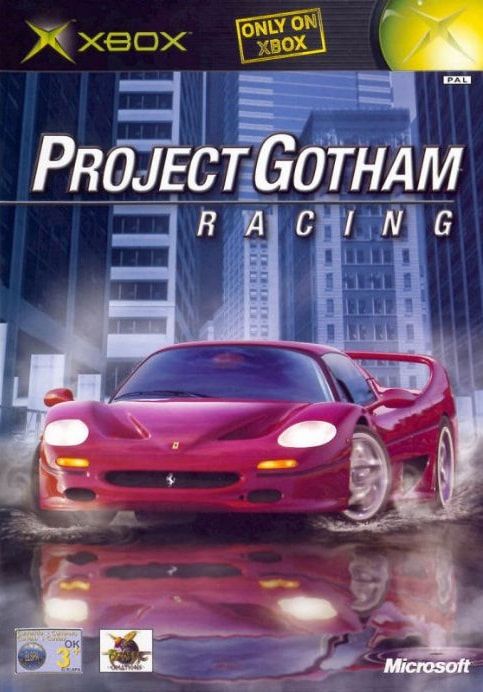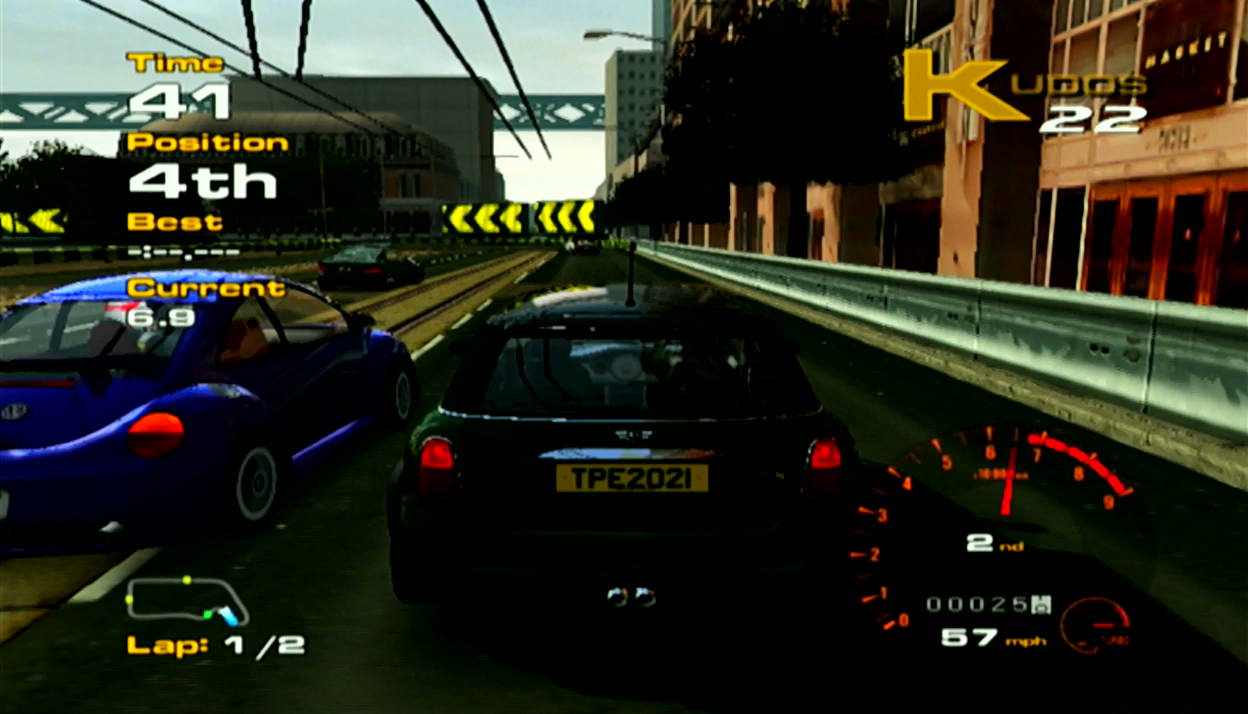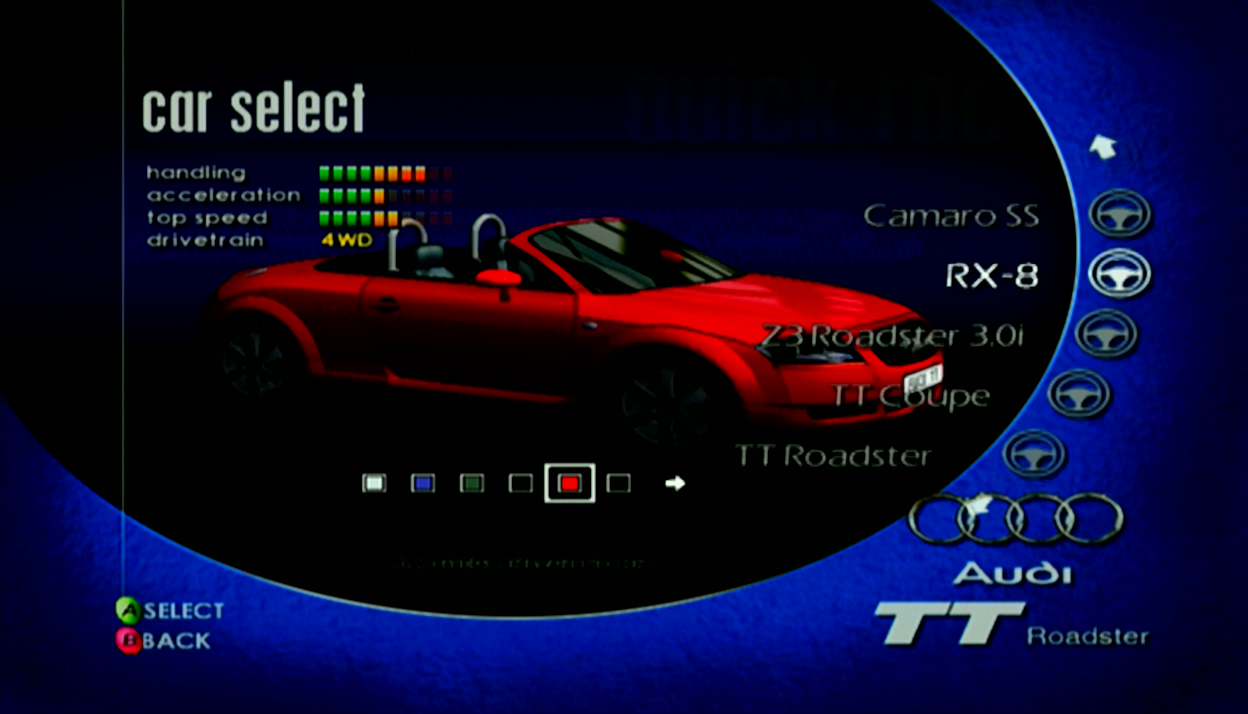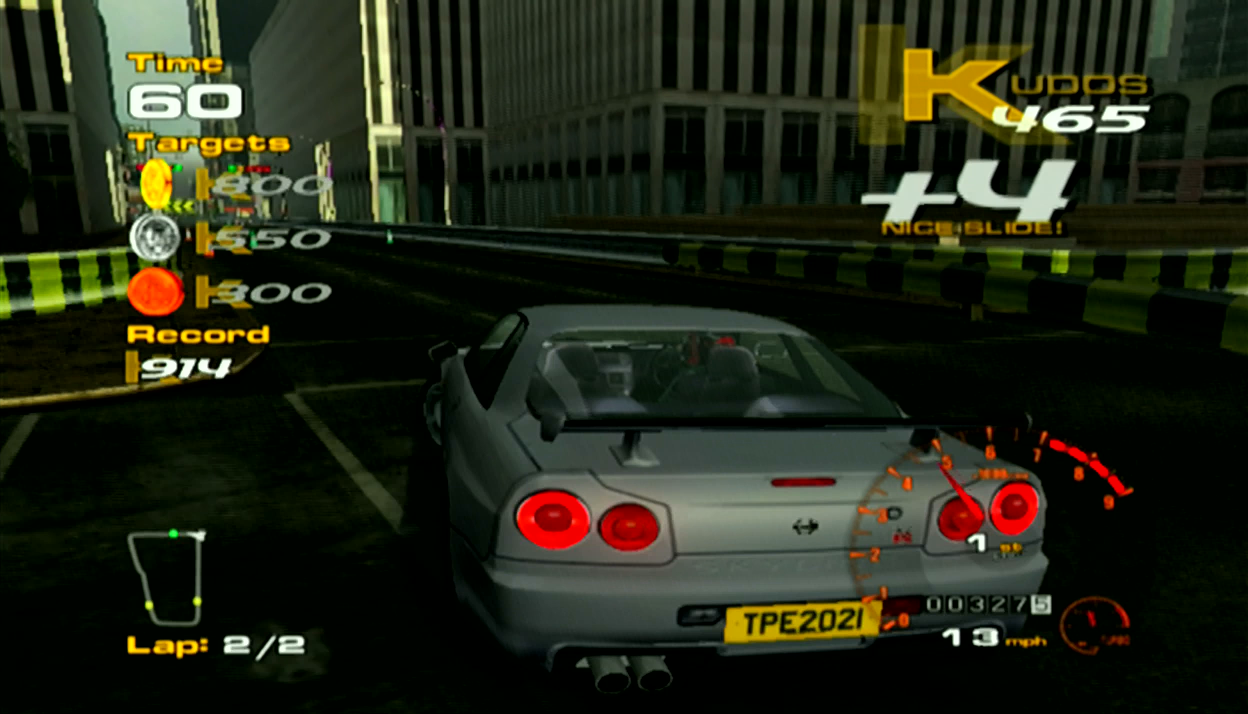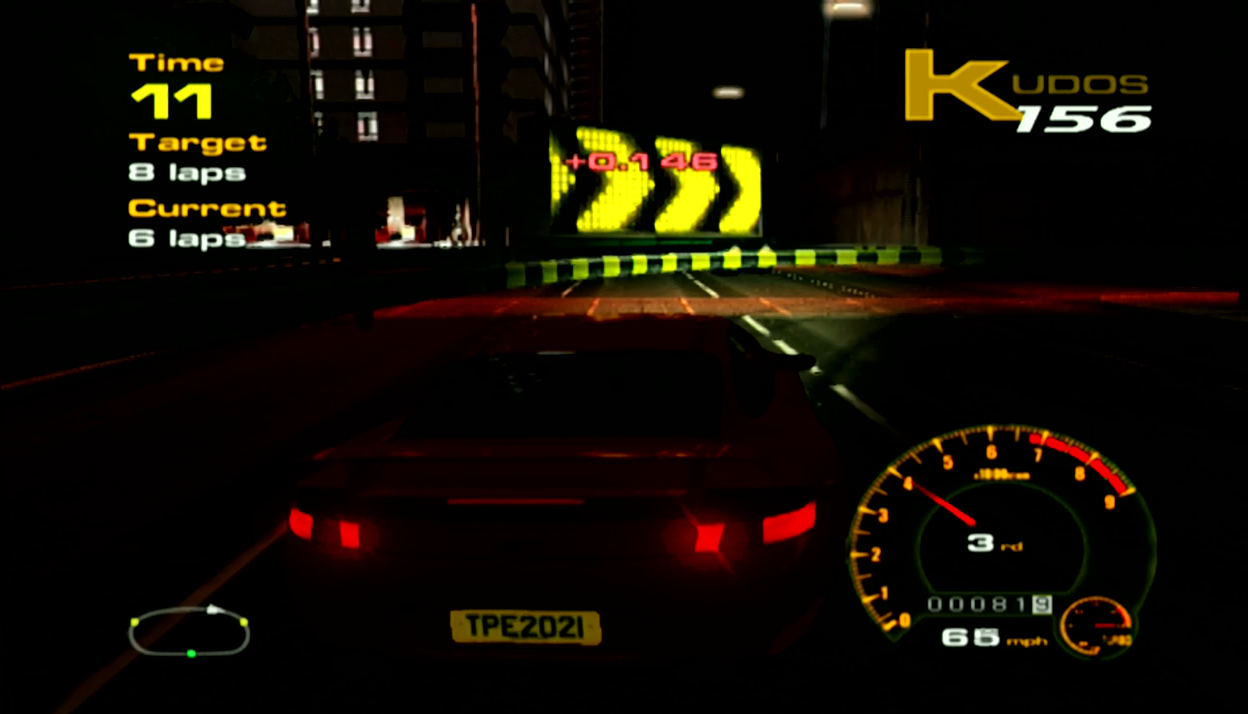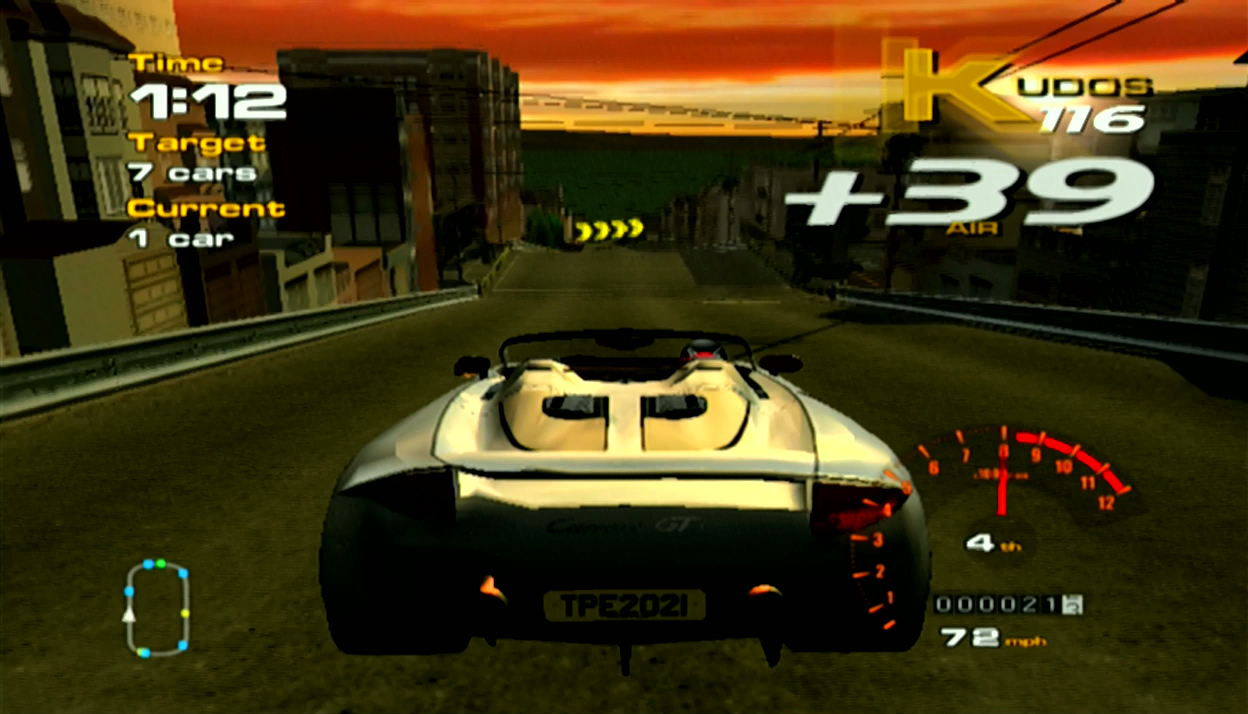PROJECT GOTHAM RACING (XBOX)
When gamers think back to the launch of the Xbox, most cite Halo as the system’s killer app. While Bungie’s FPS was certainly the standout from the line-up, it seems a bit unfair to ignore the myriad of other quality titles present. Rallisport Challenge, Jet Set Radio Future and Max Payne’s miracle port: all graced the European launch and another key player in both the launch and Microsoft’s exclusive software line-up would be Project Gotham Racing. Tapping talented British developer Bizarre Creations, their experience with racing games would be put to good use, as the debut entry of the series proves a beautiful, challenging and enjoyable racer.
The developer would walk the line between simulation and arcade racing. Think of it asa middle ground between Gran Turismo and Ridge Racer, as while the fast cars of this racer lend themselves to drifting and stylish racing, they don’t glide around corners like true arcade racers. The result is an unusual but fun mix, where weighty physics and smooth handling win the day. It’s a joy to drive around and the roster of 25 real-world cars give you the horsepower to do it. Though the early vehicles are a bit bare, you soon gain access to speedy sports rides that ramp up the excitement. It allows players to both drive with keen precision and utilise the handbrake to perform stunning slides around the corners. This ties nicely into PGR’s big selling point: the Kudos system.
The Kudos system returns from Metropolis Street Racer, meaning both style and performance matter here
Project Gotham Racing builds on the foundations laid by Bizarre Creations’ Metropolis Street Racer, a Dreamcast exclusive that pioneered the Kudos system. In essence, points are awarded for skilled-yet-stylish driving such as drifting, overtaking other drivers and driving on two wheels. Chaining moves builds points further and also rewards combo points on top of what you earn. It’s a great way to incentivise risky moves, but during most races, it plays something of a minor role. In contrast to MSR, which had gruelling Kudos requirements to unlock events, you can move the goal posts to reduce the amount of Kudos needed in a race by upping the difficulty, making earlier stages much easier. While latter stages do up the Kudos medal requirements, they should be manageable for most players. It would have been nice to see more moves rewarded, such as consistently fast driving. But it still adds some fun to the game, proving a cool system to explore.
There’s a glut of tracks and modes here to keep you invested. Across London, Tokyo and two US cities, dozens of tracks are formed by sectioning off bigger maps – and you can explore these cities fully in time trial mode too. Quick Race lets you run through a series of standard street races, each divided by difficulty. Racing is good, though it can be let down by overly aggressive AI who are all too happy to spin you out, a frustrating occurrence when some races are 15 laps. Arcade focuses on Kudos style racing, as you chain combos together utilising the track’s corners and cones left out, a challenging yet gratifying affair that puts the system to good use. Then there’s the Kudos Challenge, a 12-part mode that sees you competing in several challenges within each tier, including time trials, speed challenges, racing and Kudos events. You also gain rewards through play, including extra Time Trial courses, new cars once you hit Kudos marks and more. There’s a ton of challenge and events for the dedicated, a surprise considering it’s launch title status, but it can also be a slog in the early stages, as trying to ace these events with weaker cars proves daunting. It’s only once you earn speedier cars that things shift up a gear.
There’s a glut of tracks and modes here to keep you invested. Across London, Tokyo and two US cities, dozens of tracks are formed by sectioning off bigger maps – and you can explore these cities fully in time trial mode too. Quick Race lets you run through a series of standard street races, each divided by difficulty. Racing is good, though it can be let down by overly aggressive AI who are all too happy to spin you out, a frustrating occurrence when some races are 15 laps. Arcade focuses on Kudos style racing, as you chain combos together utilising the track’s corners and cones left out, a challenging yet gratifying affair that puts the system to good use. Then there’s the Kudos Challenge, a 12-part mode that sees you competing in several challenges within each tier, including time trials, speed challenges, racing and Kudos events. You also gain rewards through play, including extra Time Trial courses, new cars once you hit Kudos marks and more. There’s a ton of challenge and events for the dedicated, a surprise considering it’s launch title status, but it can also be a slog in the early stages, as trying to ace these events with weaker cars proves daunting. It’s only once you earn speedier cars that things shift up a gear.
Like any good launch title, Project Gotham Racing offers a good showcase of the Xbox’s potential at the time, as while later titles would up the game in terms of detail and draw distance, the 60fps driving is certainly welcome. Cars look the best, showcasing fantastic detail and reflections off the world. Nifty real-world locations look the part, even if they lack the geometry at times and the dynamic replays, which shift camera views, are a treat. The sound isn’t quite as good, with noticeably weak engine notes that don’t feel distinctive to the cars you drive. That’s not to say there aren’t some cool touches though, such as the radio losing signal when you drive into a tunnel. The music stations feel suitably narrated depending on where you are driving in the world and the plethora of licensed music is perfectly solid if unspectacular.
Project Gotham Racing proved a great starting point for a series that would enjoy a storied life both on Xbox and Xbox 360. The developer’s experience in crafting racers shows, with a sturdy engine walking the line between simulation and arcade with ease. The stacks of events, excellent graphics and challenge are all welcome, even if some issues with AI and a tough beginning may turn some off. But PGR would earn its place in the annals of Xbox with good reason and even some two decades later, it remains a great deal of fun.
|
|
VERDICT
"PGR earns it’s place with stacks of events, excellent graphics and a sturdy engine, channelling its developer’s experience in the genre with great success." OVERALL: 8/10 |
